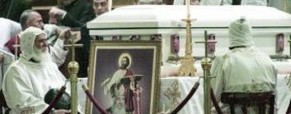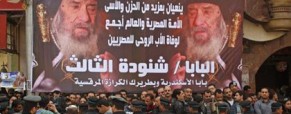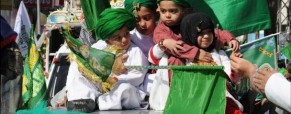Airborne prayers problem solved for tech-savvy Muslims...
By Martin Abbugao | AFP – Thu, Apr 5, 2012 As a frequent flier and devout Muslim, businessman Abdalhamid Evans always comes up against the same challenge in the air: when to say his prayers. Muslims are required to pray five times a day at certain hours, but this schedule becomes complicated when crossing various time zones at thousands of metres above sea level. “I usually don’t pray when I am in a plane,” said Evans, the London-based founder of a website that provides information on the global halal, or Islam-compliant, industry. “But lately I have been thinking that it is probably better to do them in the air than make them up on arrival,” he told AFP. The problem may be solved for travellers such as...

Egyptians bid tearful farewell to Pope Shenouda III...
By Ashraf Sadek – The Egyptian GazetteWednesday, March 21, 2012 02:04:37 PM Pope Shenouda III, the head of Egypt’s Coptic Orthodox Church of Alexandria, was laid to rest at St. Bishoy Monastery in Wadi el-Natroun to scenes of searing emotion from hundreds of thousands of Egyptian mourners. Many wailed in an outpouring of grief as the casket was flown from the Orthodox Cathedral in the Cairo neighbourhood of Abbasiya to Wadi el-Natroun by military helicopter after the ceremony. Earlier in the day, Tuesday, hundreds of thousands of Egyptians, many openly sobbing, paid their last respects to Coptic Orthodox Pope Shenouda III, popularly known as ‘Baba Shenouda’ who died on Saturday night aged...

Egyptian Muslim and Christian Mourners Flock to Funeral of Much-Loved Pope Shenouda III...
source Hundreds of thousands of Egyptians gathered Tuesday morning at St Mark’s Cathedral, in Abbassiya, Cairo for the funeral of much-loved leader of the Coptic Orthodox Church, Pope Shenouda III, who passed away Saturday. Mourners attempted to enter the cathedral grounds as prayers started at 10am, to pay their respects to the spiritual leader whose body lay in an open casket. However, many were prevented from entering the cathedral grounds, which have been shut since the early hours of Tuesday morning following an announcement by the heads of the Coptic Church that the funeral would be invite-only. Thousands of key politicians, national and international religious leaders and public figures attended. Members of the ruling Supreme Council of...

Muhammad, a consistent protector of minority rights...
Moh Yasir Alimi, Semarang | Sat, 02/04/2012 1:58 PM During this month of the Islamic calendar, Muslims are celebrating the birth of the Prophet Muhammad. Muhammad was born in the sixth century in the middle of a culture of ignorance, when people fought because of their tribal affiliations and religious beliefs and women were treated like camels. Amid such a poor condition for humanity, Muhammad came to teach humanity, tolerance, humility, equality, justice and compassion. He always emphasized consciousness of God and the divinity of human life as the gate of enlightenment, so that human beings would not enslaved by their own ego and bodily impulses. Karen Armstrong describes Muhammad as...

Prophet Muhammad a unique historical figure...
The prophet Muhammad is certainly one of the most influential figures in history. Michael H. Hart, in his book, The 100: A Ranking of the Most Influential Persons in History, puts Muhammad at the top of the 100 most influential personalities. More than a billion people across the world follow Muhammad and take him as their guide, mentor and leader. Muslims’ respect, love and reverence for Muhammad are deep and genuine. Out of regard, Muslims always say “Peace be upon him” every time they invoke his name. Muhammad’s legacy is far-reaching and permeates every aspect of Muslim life. Today, Saturday, coincides with the birthday of Prophet Muhammad. Interestingly,...

Mawlid Al-Nabi 2012: Muslims Celebrate The Birth Of The Prophet Muhammad...
Mawlid al-Nabi (also Mawlid, Milad) is the observation of the birth of the Prophet Muhammad. In 2012, Mawlid al-Nabi is observed on Feb. 4 by Sunni Muslims and Feb. 9 by Shia Muslims. The earliest account of the observance of Mawlid can be found in 8th century Mecca. Historically, this was a festival of the Shia ruling class and the first official public celebrations occurred in Egypt towards the end of the 11th century. Gradually it spread throughout the Muslim world, with the first Sunni Muslim celebration taking pace in 12th century Syria. However, Islamic scholars and theologians are divided on whether observing Mawlid is permissible within Islam. The vast majority of Wahabi scholars forbid the celebration of...






